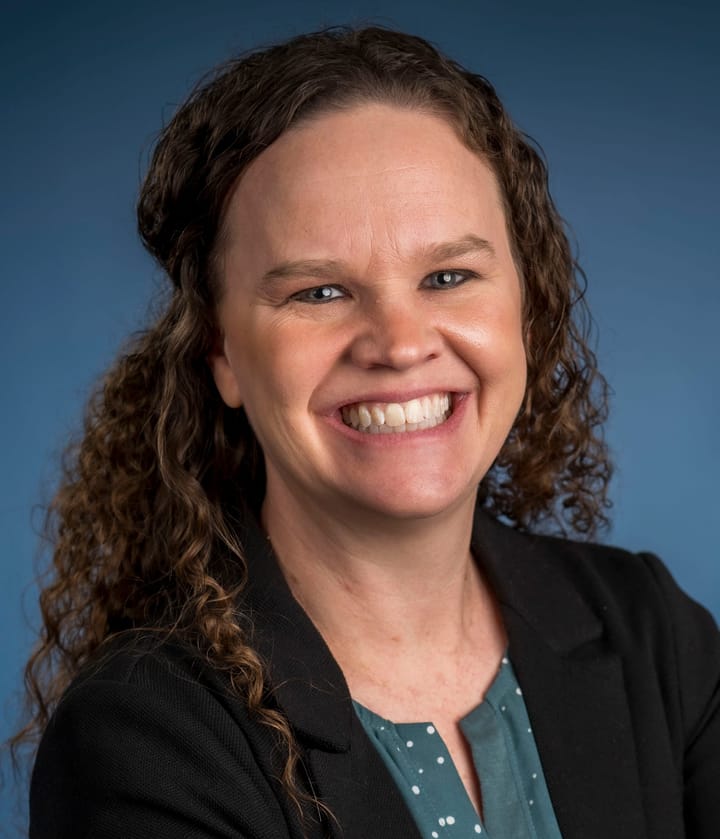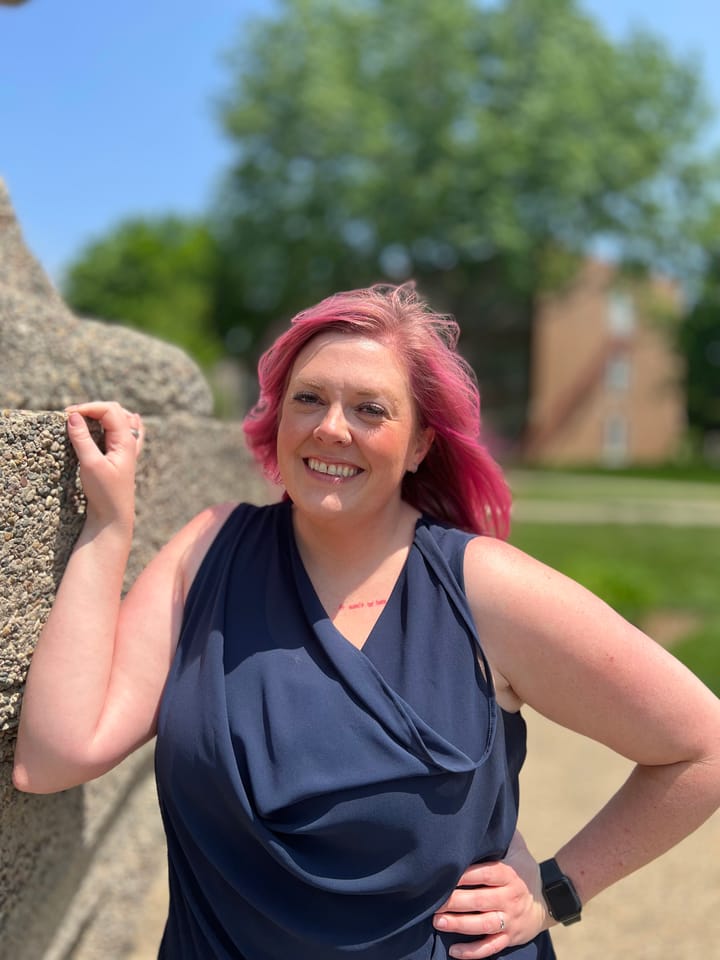Faculty vote in favor of new curriculum model, 95-41

For Sarah Rude, the moments leading up to the vote had her anxiously holding her breath. She didn’t know until all 136 votes were counted and the result was announced that her and countless others’ hard work had finally paid off.
On Wednesday, Nov. 6, 95 faculty members voted in favor of the Undergraduate Curriculum Council-proposed Via Viking curriculum, while 41 voted against it.
With a 69.85% upvote, Via Viking passed among faculty and will replace SOPHIAflex – the current curriculum.
After the UCC evaluated the core curriculum in February, the UCC assigned a summer task force to take ideas from a “small changes” and a “large changes” plan to come up with a curriculum alternative to propose to faculty this fall. This plan would become Via Viking.
Rude – English professor and co-chair of the UCC – said it was important to catch up UCC members who were not part of the summer task force or were new to the council, so the UCC pushed the faculty vote back to November. Rude said this was a good decision, as more tweaks were made in that extra month of discussion.
On Oct. 21, UCC members and ASA representatives Avery Gilman, Abby Smith and Azmeret Abebe met to decide whether Via Viking was ready to present to the faculty. The vote was unanimous, 12-0.
Nelson said that Via Viking lets students know what they will get out of an Augustana education better than SOPHIA. Nelson also said she appreciates the curriculum’s clear outcomes.
Curriculum Sens. Gilman and Smith said the UCC faculty frequently asked if the senators had any questions or comments.
“[The UCC faculty] really care about what they do,” Smith said. “When they make a curriculum, what they have in mind is how it affects our futures and what the outcomes will be, so they really want to make sure that the outcomes are positive.”
The curriculum proposal was sent to faculty on Thursday, Oct. 24 to give faculty plenty of time to review the complex and hefty 23-page document.
Amendments and Via Viking
Rude said that, for days after the document was shared with faculty, there was radio silence.
“We took that as a really good sign that people were hopefully reading the document and the motion and rationale [document] that went with it,” Rude said.
After a few days, an email rolled into Michelle Gierach – UCC co-chair and nursing professor – and Rude’s inboxes.
Stephen Minister, professor of ethics, philosophy and religion, proposed an amendment that would combine required knowledge areas and competencies from the original plan, simplifying the requirements to just ten classes. In the amendment, Minister addressed two main concerns: The selective experiences category seemed “overly complicated,” and certain knowledge areas could run into staffing shortages.
“He was very courteous, respectful, kind in letting us know before he sent it out,” Rude said.
After letting Rude and Gierach know he would be proposing the amendment, Minister sent the amendment to faculty.
It caused quite a stir, Rude said. Many saw the Via Viking amendment as a sign of contention for the proposal and that arguments would soon follow. During the faculty meeting on Nov. 6, much of the time was spent discussing Minister’s amendment. When it came time to vote, 33 voted in favor and 104 voted against.
Rude believes the amendment did not pass for two main reasons: Faculty like the flexibility Via Viking gives to students and advisers, and the amendment did not seem to have been collaborated on with as many people and departments as Via Viking had.
Minister declined to comment on the amendment.
In a previous faculty meeting on Oct. 2, economics professor Reynold Nesiba proposed a change to faculty handbook bylaws that would require a three-fifths supermajority for changes to curricula rather than the simple majority of 50% that other faculty votes require. In that meeting, Nesiba’s amendment to the bylaws was rejected.
In the same Oct. 2 meeting, Rude said the UCC planned to “honor the spirit” of Nesiba’s amendment by including a three-fifths supermajority proviso in their motion to approve Via Viking in the Nov. 6 faculty meeting.
Biology professor Mark Larson proposed an amendment to remove the three-fifths supermajority proviso, but Larson’s idea got little discussion at the Nov. 6 meeting, Rude said. His proposal did not make it to the paper ballot.
“We had confidence in the product we had come up with, sure, but just as importantly, confidence in our process for contacting faculty, making sure that they felt they had been included, that they had lots of chances to give feedback and that their feedback had been heard,” Rude said.
After about an hour of discussion, it was time to vote.
Beth Boyens – FYS director, chair of the FYS committee and English professor – voted ‘Yes,’ at the Nov. 6 meeting, primarily because she saw the curriculum as student-focused.
“I think that it gives both students and faculty clearer descriptions of why we are doing what we are doing in classes,” Boyens said. “I like the flexibility of it, and I like that I might be able to teach classes in a variety of areas that focus on a variety of outcomes.”
Nesiba voted ‘No’ on Via Viking and ‘Yes’ for Minister’s amendment because he thinks Via Viking is overly complex and that Minister’s amendment would have successfully simplified it.
“But I’m also confident that we will work together as a faculty to figure out how to have handouts and a website that will make it easier for students,” Nesiba said.
When the results of the vote were announced, Rude felt a weight lifted off her shoulders.
“Our parliamentarian, James Day, came over afterward to congratulate me, and he was like, ‘Was that a sigh of relief?’ and I said, ‘Yes, it certainly was,’” Rude said.
What’s to come
There is much work left to be done on Via Viking before freshmen arrive next semester. Gierach said it will be a long process to transform this “nebulous idea” into something tangible.
In the realm of FYS, committee members will work on developing a specific focus on reading and writing.
“Part of what FYS hopes to do is meet students where they are and to pay close attention to who the students are,” Boyens said.
Right now, Boyens said, new students often need more instruction in reading and writing, particularly on identifying arguments and supporting evidence. Joining FYS in foundational experiences will be a critical thinking class and oral communication class, which will help to focus FYS, Boyens said.
Student Learning Outcomes for FYS are also being updated. Boyens said the old outcomes suggested students would walk away with a “level of mastery” in their writing, a lofty goal. Boyens hopes the new outcomes will be more attainable for first-semester students.
Gierach has worked alongside Will Swart, director of Augustana’s Civitas Honor Program, to determine how Civitasians will navigate Via Viking.
Currently, Civitasians can substitute four SOPHIA classes from specific categories for Civitas courses. Though decisions have yet to be finalized, Civitasians will still substitute core classes for Civitas classes under Via Viking – only substitutions will be limited to the selective experiences category.
As for the main structure of the newly approved education model, Gierach and Rude said it will be a lot of “cross-checking” – making sure that courses are tagged with accurate competencies, assigned to the number code within a new numbering system and aligning courses with American Association of Colleges and Universities rubrics.
Gierach and Rude said they will also begin training faculty on how to advise Via Viking.
Although the plan now is to spend the foreseeable future with Via Viking, there will be plenty of opportunity for evaluation, discussion and adjustment among faculty, Gierach said.
“I think some people think of the curriculum as very stagnant,” Gierach said. “No, it’s living and breathing.”



